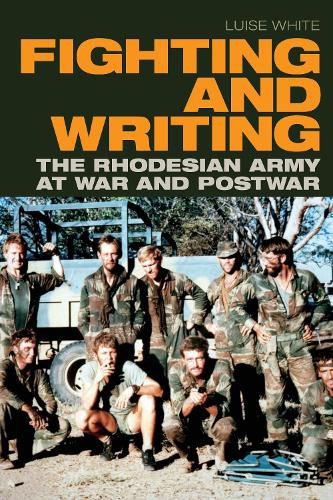Readings Newsletter
Become a Readings Member to make your shopping experience even easier.
Sign in or sign up for free!
You’re not far away from qualifying for FREE standard shipping within Australia
You’ve qualified for FREE standard shipping within Australia
The cart is loading…






In Fighting and Writing Luise White brings the force of her historical insight to bear on the many war memoirs published by white soldiers who fought for Rhodesia during the 1964-1979 Zimbabwean liberation struggle. In the memoirs of white soldiers fighting to defend white minority rule in Africa long after other countries were independent, White finds a robust and contentious conversation about race, difference, and the war itself. These are writings by men who were ambivalent conscripts, generally aware of the futility of their fight-not brutal pawns flawlessly executing the orders and parroting the rhetoric of a racist regime. Moreover, most of these men insisted that the most important aspects of fighting a guerrilla war-tracking and hunting, knowledge of the land and of the ways of African society-were learned from black playmates in idealized rural childhoods. In these memoirs, African guerrillas never lost their association with the wild, even as white soldiers boasted of bringing Africans into the intimate spaces of regiment and regime.
$9.00 standard shipping within Australia
FREE standard shipping within Australia for orders over $100.00
Express & International shipping calculated at checkout
Stock availability can be subject to change without notice. We recommend calling the shop or contacting our online team to check availability of low stock items. Please see our Shopping Online page for more details.
In Fighting and Writing Luise White brings the force of her historical insight to bear on the many war memoirs published by white soldiers who fought for Rhodesia during the 1964-1979 Zimbabwean liberation struggle. In the memoirs of white soldiers fighting to defend white minority rule in Africa long after other countries were independent, White finds a robust and contentious conversation about race, difference, and the war itself. These are writings by men who were ambivalent conscripts, generally aware of the futility of their fight-not brutal pawns flawlessly executing the orders and parroting the rhetoric of a racist regime. Moreover, most of these men insisted that the most important aspects of fighting a guerrilla war-tracking and hunting, knowledge of the land and of the ways of African society-were learned from black playmates in idealized rural childhoods. In these memoirs, African guerrillas never lost their association with the wild, even as white soldiers boasted of bringing Africans into the intimate spaces of regiment and regime.